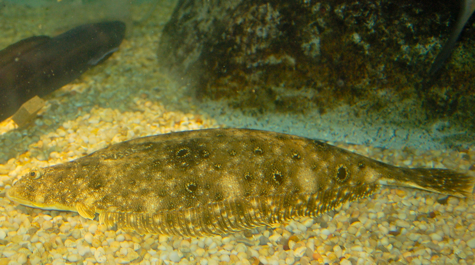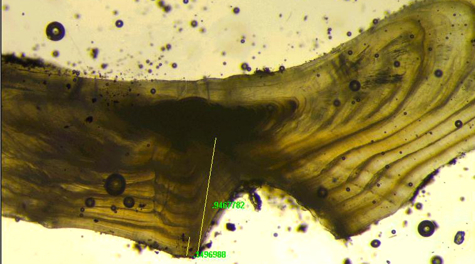VIMS and VMRC partner to collect and study summer flounder
Agencies ask for anglers' help in providing carcasses
The Virginia Institute of Marine Science is partnering with the Virginia Marine Resource Commission (VMRC) to collect summer flounder carcasses from recreational anglers through the fall of 2010.
The goal of the undertaking, a new part of VMRC's Marine Sportfish Collection Project, is to better understand the recreational harvest and life history of both males and females of the species.
The Marine Sportfish Collection Project focuses on species of fish that are difficult to collect through VMRC's normal sampling program. VMRC also seeks donations of carcasses of red drum, black drum, cobia, spanish mackerel, tautog, tilefish, and grouper.
VIMS research technician Erin Reilly says "Anglers catch and fillet their fish, but instead of throwing the carcass away, they can donate it to science." VIMS researchers will study the length, age, and sex of the donated flounder. They will determine age by analyzing the otolith, a small ear bone that like a tree develops annual growth rings.
VMRC spokesman John Bull says "The information gathered by VIMS will help VMRC assess the health of these fish populations without collecting large numbers of live fish to study. As a result, this project will leave more fish out there for anglers to catch next time."
Anglers are asked to donate filleted carcasses of freshly caught and legal size (18.5 inches and longer) summer flounder by placing them in freezers that are available at popular marinas and bait and tackle shops throughout the Chesapeake Bay region. They are asked to keep the head and tail intact.
Freezers are located at the following locations:
- Chris' Bait and Tackle in Capeville
- Long Bay Pointe Marina in Virginia Beach
- Virginia Beach Fishing Center in Virginia Beach
- Rudee Inlet Station Marina in Virginia Beach
- Wallace's Bait and Tackle in Hampton
- Buckroe Fishing Pier in Hampton.
Each freezer will hold two donation kits, one for regular donations, and a special flounder-only donation kit (look for the yellow sheet with white bag kits).
In return for participating in the project, VMRC will provide a free hat, boat whistle, measuring tape, or T-shirt with a specially designed logo. The gifts are limited to one for each participant, per month of the donation. VMRC commissioner Steve Bowman says "Everyone who has seen the T-shirt wants one. They are quite an attention-getter and wearing one will promote an important scientific project."
VMRC will also post specific information about the donated fish on the agency's website, including information on the sex and age of each angler's catch.
The Marine Sportfish Collection Project is part of VMRC's Virginia Recreational Assessment Program, a new initiative to develop improved fishery information in cooperation with the recreational fishing community.
The flounder study, which began on July 24th, is also part of a larger program organized by Rutgers University. The goal of the Rutgers' program is to gather information on the summer flounder fishery from Massachusetts to North Carolina.


